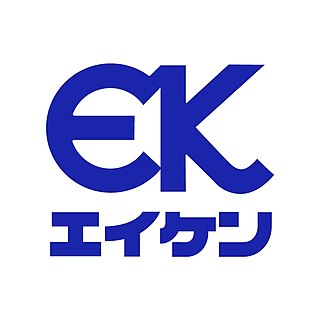Top Qs
Timeline
Chat
Perspective
Eiken (studio)
Japanese animation studio From Wikipedia, the free encyclopedia
Remove ads
Eiken Co., Ltd. (株式会社エイケン, Kabushiki gaisha Eiken) is a Japanese anime studio in Arakawa, Tokyo, Japan. The company was formerly known as Television Corporation of Japan Co., Ltd. or TCJ before the sales division spun off to form Zuiyo Eizo. As a result, it changed its name in 1969 to Eiken. It is a wholly owned subsidiary of ADK Emotions.
You can help expand this article with text translated from the corresponding article in Japanese. (July 2024) Click [show] for important translation instructions.
|
Remove ads
History
Summarize
Perspective
The studio was established as Television Corporation of Japan (日本テレビジョン株式会社, Nihon Terebijon Kabushiki-gaisha; TCJ) in 1952. It started off producing commercials before entering the anime industry with adaptations of Ko Kojima's Sennin Buraku and Mitsuteru Yokoyama's Tetsujin 28-go. Since then, it has co-produced (with TBS) numerous anime like Super Jetter, Space Boy Soran, Noboru Kawasaki's Skyers 5 and Sanpei Shirato's Sasuke.
In March 1969, TCJ manager, Shigeto Takahashi, along with the sales division, spun off from TCJ, to form Zuiyo Eizo. The animation division remained and spun-off itself to TCJ Video Center Co., Ltd (TCJ動画センター株式会社, TCJ Douga Senta Kabushiki-gaisha). The company struck gold with their anime adaptation of Machiko Hasegawa's long-running manga, Sazae-san. It still continues to run on Fuji TV to this day, making it the longest running anime. It renamed itself to Eiken in 1970 to produce Norakuro-kun and eventually adopted it as its official name in 1973.
Remove ads
Works
TCJ era
- Sennin Buraku (1963–1966, Fuji TV)[2]
- Tetsujin 28-go ("Gigantor" in North America) (1963–1966, Fuji TV, planning by Dentsu)[3]
- 8 Man ("The 8th Man" in North America) (1963–1964, TBS)[4]
- Super Jetter (1965–1966, TBS)[5]
- Space Boy Soran (1965–1967, TBS)[6]
- Prince Planet (Yūsei Shōnen Papii) (1965–1966, FNS)[7]
- Yūsei Kamen (1966–1967)[8]
- Bōken Gabotenjima (1967)[9]
- Skyers 5 (1967, TBS)[10]
- The Cricket on the Hearth (1967)
- Sasuke (1968–1969, TBS)[11]
- Ninpū Kamui Gaiden (1969, Fuji TV, planning by Zuiyo)[12]
- Sazae-san (1969–current, Fuji TV)[13]
- Kamui Gaiden (1969, film)[12]
- Dōbutsu-mura Monogatari (1970, NET)[14]
- Bakuhatsu Gorō (1970, TBS)[15]
- Norakuro (1970–1971, Fuji TV)[16]
- Shin Skyers 5 (1971–1972, TBS)[10]
- Onbu Obake (1972–1973, Yomiuri TV)[17]
Eiken era
- Bōken Korobokkuru (1973, Yomiuri TV)[18]
- Jim Button (1974, MBS)[19]
- Iruka to Shōnen (1975, TBS)[20]
- Hokahoka Kazoku (1976–1982, Fuji TV)[21]
- UFO Warrior Daiapolon (1976, TBS)
- UFO Senshi Daiapolon 2 (1976, Tokyo 12ch)[22]
- Captain (1980, NTV; TV special)[23]
- Captain (1981, film)[23]
- Donbē Monogatari (1981, NTV)[24]
- Captain (1983, TV series)[23]
- Glass Mask (1984, NTV)[25]
- Ginga Patrol PJ (1984, Fuji TV)[26]
- Dotanba no Manā (1984–1987, Fuji TV)[27]
- Musashi no Ken (1985–1986, TV Tokyo, "shonen" version)[28]
- Musashi no Ken (1986, "seishun" version)[28]
- Kotowaza House (1987–1994, Fuji TV)[29]
- Hai Akko Desu (1988–1992, ABC)[30]
- Shīton Dōbutsuki (1989–1990, NTV)[31]
- Kobo-chan Special: Filled with Autumn (1990)[32]
- Kobo-chan Special: Filled with Dreams!! (1991)[32]
- Micro Patrol (1991, joint release in France and Japan, OVA series released in Japan as well)[33]
- Kobo-chan (1992–1994, Yomiuri TV)[32]
- Cooking Papa (1992–1995, ABC with Asatsu)[34]
- Kobo-chan Special: Filled with Festivals! (1994)[32]
- Oyako Club (1994-2013, Fuji TV)[35]
- Ijiwaru Bā-san (second series, 1996–1997, Fuji TV)[36]
- Kiko-chan Smile (1996–1997, TBS with Magic Bus)[37]
- Otoko wa Tsurai yo: Torajirō Wasure na Kusa (1998, TBS with Magic Bus)[38]
- Kobo-chan Special: The Promised Magic Day (1998)[32]
- Suteki! Sakura Mama! (2000)[39]
- Go! Go! Itsutsugo Land (2001–2002, with Magic Bus)[40]
- Gokiburi-chan (2005)[41]
- Play Ball (2005, with Magic Bus)
- Play Ball 2nd (2006, with Magic Bus)[42]
- Tetsujin 28-go Gao! (2013–2016, Fuji TV)[43]
- Bonobono (2016–current, Fuji TV)[44][45]
Remove ads
References
External links
Wikiwand - on
Seamless Wikipedia browsing. On steroids.
Remove ads


